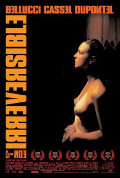
Directed by
Gaspar Noe
105 minutes
Rated R
Reviewed by
Bernard Hemingway

Irreversible
Synopsis: Two men (Vincent Cassel and Albert Dupontel) are desperately seeking someone called La Tenia. We are about to find out why.
The French have a term for it, a succés du scandale, an event which attracts attention by virtue of having offended public opinion. Irreversible can justly be called such a success. A succés du scandale, is not necessarily without aesthetic merit – modern Western painting is founded on the 1863 Salon des Refusés, which featured Manet’s anti-classical painting of a naked lady picnicking with three clothed men – an outrage to what was considered good taste at the time. Although Irreversible has been promoted as an ‘art-house’ film (it won Best Film at the 2002 Stockholm Film Festival) and critically-celebrated as ‘challenging’ cinema, imagine that Manet had painted a bludgeoned rodent and hung the result upside down and you’d have some idea of where Gaspard Noé’s contribution is likely to end up in the annals of film history
Irreversible has two main claims to infamy - a nine minute anal rape scene and the fact that the film is ‘reversed’. The first item is the less significant of the two. The rape is not graphic and it and the subsequent post-rape beating are too evidently choreographed to present a real threat to anyone reasonably well-inoculated to filmic violence. Far more visually repugnant is an earlier scene in which a man has his skull crushed by repeated blows with a fire extinguisher in front of the appreciative clientele of a sado-masochistic gay bar, less than wittily called Rectum. The rape is, however, ostensibly protracted and this will scandalize many, for a variety of reasons. Is there any point or justification for this prolongation? None that I can recall. Perhaps as up to this point the audience has been subjected to an unrelenting barrage of verbal and/or physical aggression anything less would have appeared trivial. I’ve not seen Noé’s earlier films but the simpler explanation is that he is exercising his interest in violent, debasing sex (Pasolini’s Saló is one of his points of reference).
The rape scene is the point at which the film effectively divides into two parts, between shit and sunshine and this leads us to the main aesthetic ploy of the film, the fact that it unfolds in reverse (this includes the strikingly effective closing credits which we see first). Thus, we open with a scene in prison and proceed to discover how a sequence of events took place. This is not handled, as per Memento, to which this is rather pointlessly compared, for example, through a series of time shifts or framed through different points of view but is a straightforward chronological reversal of scenes. Barring the opening (i.e. closing) coda between two never-seen-again characters the narrative is divided into a number of scenes, the last one played first and so on, each juncture bridged by the camera going to black.
As we are accustomed to narratives building from set-up to climax then winding down to resolution, there are real problems for Irreversible in simply reversing this process. At its simplest level we do not know who the characters are, but more importantly nor we do have any connection with them. Of course we bring to bear our familiarity with filmic conventions and fairly soon piece together the whole. The film attempts to overcome this shortcoming by adopting a high energy, kinetic style, the camera sways around madly, the Vincent Cassel character a torrent of verbal abuse and manic energy. But particularly as the film settles down (mercifully some will say) into a steadier mode, there is not enough, verbally or visually to sustain interest in a journey whose destination we already know.
The film may have been much better, with a significant emotional and moral impact, had it played forward. The recently-released and unjustly-neglected Wonderland which also deals with a brutal murder and the chain of events leading to it, told in multi-perspective flashback, is a far more interesting and effective film.
Gimmick-value aside, compared to last year’s succés du scandale,Baise Moi, not coincidentally French and concerned with sex and violence, this is a technically more adventurous and in some ways more commendable film. Or so one might think until the final couple of scenes when Noé lays out his grand themes of life and death with the subtlety of an undergraduate essayist, dispelling any doubt that Irreversible is as scandalous, and as significant, as seeing the Emperor without any clothes.

Want more about this film?


Want something different?




